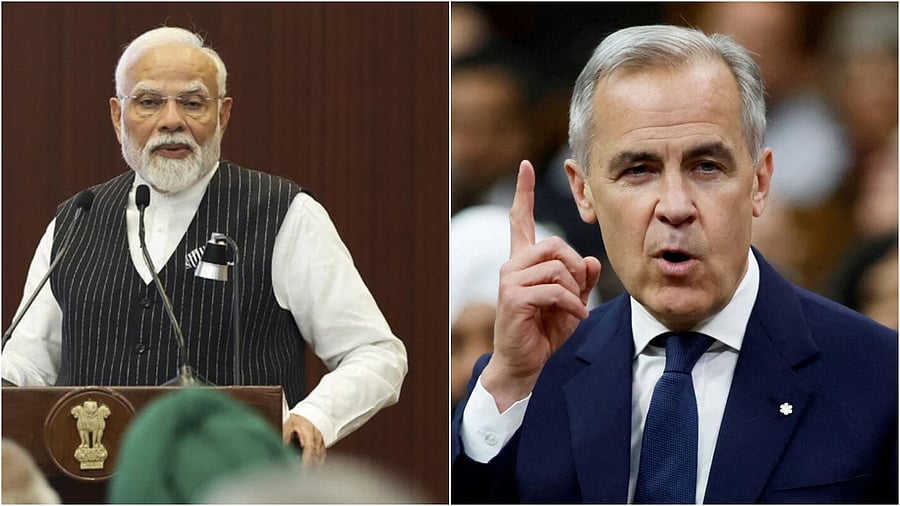
India's Prime Minister Narendra Modi (L); Canadian PM Mark Carney.
Credit: PTI, Reuters File Photos
New Delhi: In a sign of a thaw between New Delhi and Ottawa, Prime Minister Narendra Modi is set to attend the G7 summit to be held in Canada from June 15 to 17 – a conclave, which would also give him an opportunity to hold talks with United States President Donald Trump.
Though Trump has been overlooking New Delhi’s rebuttals and repeatedly claiming credit for brokering a ceasefire between India and Pakistan last month, Modi’s meeting with the US president on the sidelines of the G7 summit in Canada is likely to add momentum to the negotiations between the two nations for the trade deal. The two leaders had last met in the White House in Washington, D.C., on February 13, when they had agreed to conclude at least the first tranche of the agreement by fall this year.
Modi on Friday received a call from Canadian Prime Minister Mark Carney, who invited him to attend the G7 summit to be held at Kananaskis, Alberta, in the North American country. “Glad to receive a call from Prime Minister @MarkJCarney of Canada. Congratulated him on his recent election victory and thanked him for the invitation to the G7 Summit in Kananaskis later this month,” the prime minister posted on X, adding: “As vibrant democracies bound by deep people-to-people ties, India and Canada will work together with renewed vigour, guided by mutual respect and shared interests. Look forward to our meeting at the Summit.”
As Ottawa delayed sending an invitation to New Delhi, uncertainty loomed large over Modi’s participation in attending the summit to be hosted by Carney, particularly given the setbacks the India-Canada relations suffered in 2023 and 2024.
Carney invited Modi to attend the G7 outreach session, although India is not a member of the bloc, which comprises Japan, Italy, France, Germany, Canada, the United States and the United Kingdom.
The European Union is a ‘non-enumerated’ member of the G7.
Atal Behari Vajpayee was the first prime minister to participate in a G7 summit. He attended the outreach session of the bloc’s summit in 2003. Prime Minister Manmohan Singh participated in the conclaves from 2005 to 2009.
Modi has been attending the outreach sessions of the G7 summits since President Emmanuel Macron invited him to the conclave he hosted at Biarritz in France in 2019. Though the 2020 summit did not take place due to the Covid-19 pandemic, he also virtually took part in a similar event during the bloc’s summit hosted by the British Prime Minister Boris Johnson at Cornwall in the United Kingdom in 2021. He attended the G7 summits in Germany, Japan and Italy in 2022, 2023 and 2024 too.
Carney took over as the Liberal Party’s leader on March 9 and as the prime minister on March 14, after the resignation of Justin Trudeau. The Liberal Party beat the Conservative Party, led by Pierre Poilievre, in the elections held on April 28, but fell just short of winning the majority in the House of Commons.
The relations between New Delhi and Ottawa had hit a new low on September 18, 2023, when Trudeau had accused India of having a role in the killing of Khalistani Sikh terrorist Hardeep Singh Nijjar in Canada. Ottawa in October 2024 had gone on to accuse New Delhi’s envoy to Ottawa, Sanjay Kumar Verma, and his five colleagues of having a role in the June 18, 2023, killing.
New Delhi had withdrawn Verma and its other diplomats in the North American country after denying Ottawa’s request to waive their diplomatic immunity and to make them available for questioning by the police investigators in connection with the murder of Nijjar. India had also expelled six diplomats of Canada.
The two leaders discussed the longstanding relationship between Canada and India, including deep people-to-people ties and significant commercial links. Importantly, there was agreement to continue law enforcement dialogue and discussions addressing security concerns, according to a press release issued by the Canadian prime minister’s office in Ottawa.
